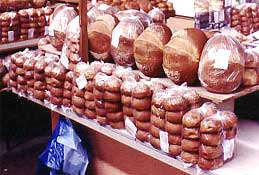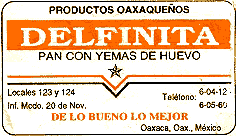
In Oaxaca, Mexico, the market called Mercado 20 de Noviembre lies across the street on the south side of the more famous Mercado Juárez, which is located near the main plaza, where all the tourists gather. Mercado Juárez mostly sells fruits, vegetables, and handicraft, but Mercado 20 de Noviembre consists mostly of comedores offering cheap prepared food and stalls selling locally baked bread. One bread stall stands next to the other, and as I wander among them I gain the impression that among the breads of each stall there is always at least one bread unique to just that stall alone. I pause before the stall pictured to the left. Here basketball-size, glazed, tan-colored loafs are packaged in clear plastic bags. Inside each bag there is this printed label:

The label declares this to be "Delfinita Bread," a product of Oaxaca; the words pan con yemas de huevo mean "bread made with egg yolk." The slogan De lo bueno lo mejor means, "From what's good comes the best." The label further says that more information is available at Stalls #123 and #124 in Mercado 20 de Noviembre. As I'm admiring the bread, a young woman of about twenty walks up. She is approximately as bubbly and giggly as a young woman selling bread can be. I ask for her name.
"Delfinita," she laughs.
"No, I mean your full name."
"Delfinita, that's all," she repeats, with a firmness indicating that, really, that's the only name she's willing to give. But she does say that since business is a little slow right now, she'd be glad to tell me about her work, even though she can't imagine anyone having any interest at all in what she does.
"I'm from the town of Santo Domingo Tomaltepec," she begins, now looking rather serious. "We are a town of about 500 adults, and most of us are bakers, maybe fifty to sixty percent of us. My parents also bake, as do several other members of the family. Yes, we're a village of bakers. There are other baking villages around Oaxaca, but they bake different bread. If you're from Oaxaca and you see our bread, you know that it's from Santo Domingo Tomaltepec because all of us in Santo Domingo bake the same kind of bread. In Oaxaca there must be fifty different kinds of bread -- each with its own characteristic blend of ingredients, manner of being baked, and with its own unique shape. Our bread is special because it contains egg yolk, is flavored with anise, and topped with sesame seed. Also, though we do have some nice French-made machines that do our kneading for us, we bake our bread in traditional brick ovens, and use the firewood called encino negro (black oak)."
I ask if it's a very profitable business, and she just laughs, and begins quoting some figures.
"We have to buy that encino negro, which costs between U.S. $6.67 and $8.33 per load. With a load we can bake approximately 300 small loaves, or buns, and each bag of ten buns brings us 83 cents. We also must buy the sesame seed, flour, eggs, butter, and anise. Then atop that there's the cost of the plastic bags and the printed labels, plus we have to pay for transporting the bread from Santo Domingo to here, and we must rent two market stalls from which to sell the bread.
In other words, I've figured out that I need to invest about 67 cents for every 83-cent bag of buns I sell. I have to bake, bag, transport, and market an 83-cent bag of ten buns in order to clear 16 cents; of course that means that I'm making a profit of just 1.6 cents per bun. And you've been here for about fifteen minutes, and you tell me how many people have come by buying my buns... "
No one during the last fifteen minutes has bought any Delfinita Buns.
"I think about these figures every morning when I get up at 6 o'clock to prepare the dough, and I think about them every time I take the bread from the oven and the hot vapor just pours out, hitting me in the face, burning my eyes. It's so hot, so terribly hot. And then you go out in the cold air, and that affects you again. It's the drastic changes in temperature all the time that really hurt you... "